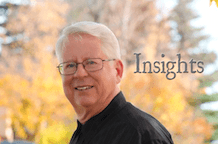 I remember meeting my first Anglican theological student friends from Trinity and Wycliffe Colleges, Toronto, during planning sessions for the annual conferences of the Canadian Theological Students Association (CTSA). We met during the mid-’60s at the Ecumenical Institute, St. George St., Toronto, under the guidance of the inimitable Canon Hugh L. Puxley, director.
I remember meeting my first Anglican theological student friends from Trinity and Wycliffe Colleges, Toronto, during planning sessions for the annual conferences of the Canadian Theological Students Association (CTSA). We met during the mid-’60s at the Ecumenical Institute, St. George St., Toronto, under the guidance of the inimitable Canon Hugh L. Puxley, director.
As the first Canadian Lutheran representative to sit as a CTSA planning committee member, I now view this as the beginning of a lifelong faith journey. Happening a half-century ago, relationships were formed then among a spectrum of Catholic, Anglican, mainline and evangelical Protestant Christians. I still continue to be friends with some of them.
Canon Puxley was instrumental in helping me gain acceptance to the
World Council of Churches’ (WCC) Bossey Graduate School of Ecumenical Studies, at the University of Geneva in 1967. What an expansive, perspective-changing experience Bossey was for me. Within a few years, my church exposure had grown exponentially from studying at a regional denominational seminary in Ontario to a tantalizing engagement with the global church.
During the 1960s, the WCC and Vatican II brought Roman Catholics into encounter with large groupings of Protestant and Orthodox Christians. At Bossey, I was living and learning—incubating, you might say—with a veritable cross-section of Christianity representing cultures, races and creedal backgrounds from around the world.
All this is to say that the ecumenical movement is much more than formal gatherings of theologians and church delegates. I believe that my experience is now shared by many, as diverse Christians expand their faith communities and celebrate the unity we share in Jesus Christ.
Ecumenism leads naturally to interfaith relations. As we Canadians discover community growth involving Christians of many backgrounds, we also begin to create linkages between ourselves and persons of other faiths, or of no faith.
While at Bossey, I first encountered ideas emerging from parts of the world where Christians were minorities living in countries dominated by other religions. Later, when the WCC met in 1968 in Uppsala, Sweden, the impact of other faiths upon Christians and the pressing need for dialogue were discussed.
Uppsala reflected the council’s expanding membership (235 churches then, about 350 now) as the world was evolving into a very different neighbourhood. Today, what once seemed to be a concern for “other people and places” has become a living reality close to home.
Principles once learned from ecumenical dialogue can often be applied to interfaith situations. For example: affirming meanings we have in common before trying to tackle differences, and finding truths humans practise universally while following different religious systems.
Our global village grows smaller and our faith communities expand to play an increasing role in building human unity, justice and peace.
Hans Küng famously wrote: “We affirm that a common set of core values is found in the teachings of the religions, and that these form the basis of a global ethic,” and, “No peace among the nations without peace among the religions. No peace among the religions without dialogue between the religions. No dialogue between the religions without investigation of the foundation of the religions.”
Author
-

Wayne Holst
Wayne A. Holst was a Lutheran pastor (ELCIC) for twenty-five years; he taught religion and culture at the University of Calgary for a quarter century and, for 15 years, he has coordinated adult spiritual development at St. David’s United Church, Calgary.






